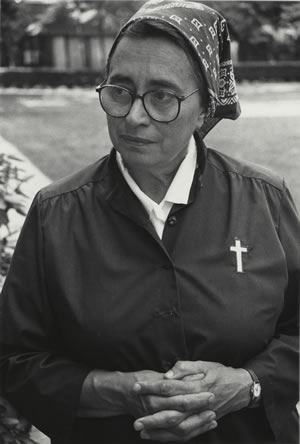Lucy Poulin
H.O.M.E. (Homeworkers Organized for More Employment), the low-income housing cooperative which Lucy Poulin founded, serves a poor and rural community of 8,000 located in Orland, Maine. The H.O.M.E. co-op has offered jobs, food, temporary shelter, education and home ownership to the rural poor for the past 28 years.
Lucy, the eighth of eleven children, grew up in a poor family in Fairfield Center, Maine. Her widowed mother imparted a strong work ethic to the Poulin children. “We worked to survive,” recalls Lucy, “waking up early for the chores of the farm, hauling water for the cows, and chopping and burning wood for our heat.” Lucy worked at a chicken factory and a paper mill and tended her mother’s farm from the age 13. She and her brother Michael (who won an equestrian bronze medal at the Barcelona Olympics in 1992) began a riding academy to earn more money for the farm. In 1957, Lucy joined a Carmelite order; seven years later, the order assigned her to a Carmelite group in Bucksport, Maine. “I was doing a lot of work with local poor people and I had no real training and no college degree. Slowly, some projects like a knitting and weaving outlet developed out of our various needs. That was the beginning of my work in Orland.”
Lucy champions what she calls “self-development economics.” In 1970, she created H.O.M.E. as a cooperative to help local home-crafters sell their goods. Now located on 23 acres of land, the co-op has expanded into a free health clinic, a soup kitchen, a food bank, and five homeless shelters. It is also a learning center with daycare, literacy and General Education Degree tutoring, alternative high school- and college-level programs, and job and craft training. It has pottery, leather and weaving shops; a greenhouse and a farmer’s market; a sawmill and a shingle mill; and a service that delivers firewood to the elderly. H.O.M.E. also has created a land trust of 700 acres for the construction of low-income housing. By 1998, construction had been completed on 30 homes and had begun on 20 more. Each year, as many as 750 volunteers help H.O.M.E. build houses, provide health services, chop firewood and do repairs. And every year, more than 8,500 people receive employment or other services from the H.O.M.E. community.
Lucy has organized a cultural exchange between Orland and the Guatemalan town of San Juan Comalapa Chimaltenango. Each year, Lucy travels to Guatemala with a group from the U.S. who contribute a little money and a lot of hard work to support a community house, a weaving co-op, and a medical clinic which Lucy helped to organize in the town.
“The main thing is that there is dignity in the exchange,” Lucy says. “It’s so easy to go down there and take; that’s why we structure the exchange to be a home stay and work visit so that we live with the families, work for them, and get to know them.”
In 1994, Maine granted H.O.M.E. a large land grant for low-income housing throughout the state. Lucy is currently creating six or seven land trusts through which cooperative houses and communities can be built.
With her hectic schedule and full life, Lucy says her biggest challenge is to try to be a loving human being and to live with others harmoniously. “I gather my strength from the life I lead. It’s a privilege to live with extraordinarily good people, to plant gardens and build houses and teach others how to live on a farm. Farm life gives life to everyone.” For support, she says, “I slow down, pray the rosary, talk to others in my community, and spend time with the animals—the ducks, geese, Pyreneen dogs, goats and horses.” Her adopted son Jimmy, who was born with Fetal Alcohol Syndrome, is also a source of inspiration. “Having a son is like a miracle.”
Lucy Poulin’s welcoming spirit characterizes her life and work. Eddie, a neighbor, was known for his prejudice and intimidating displays of violence. Lucy invited him to join the H.O.M.E. community because she’d rather have him “inside shooting out instead of outside shooting in.” He took a job as a sawyer in the sawmill and eventually flourished as a member of the community. “Alienation creates the anger we see in this world.” Her community is named after St. Francis because, Lucy explains, “it just fits who and what we are. St. Francis emphasized a simple life, the wonder of animals, and the acceptance and welcoming of everyone.”
 Photo by Dorothea von Haeften
Photo by Dorothea von Haeften